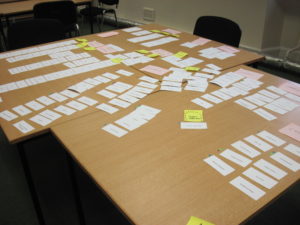Understanding and meeting students’ expectations
What do students expect and how can the University change to meet their individual needs and aspirations?
That was the focus for an event, attended by Rachel, Neil and I from the University Website Programme, about the aspirations and expectations for the forthcoming, and final year, of the Student Experience Project.
There was a strong emphasis on:
- finding ways for students to really feel they have joined, and are contributing to, an amazing community
- looking for creative ways to respond to individual needs and give each student in our community a personalised service.
And it’s not just about giving a personalised service; it’s about enabling students to be co-designers and owners of their student experience, academic and otherwise.
And as one of the speakers – Gavin Douglas, Deputy Secretary of Student Experience – has written in his blog, “But how exactly we can deliver a more individualized student experience?…. I suspect technology will be a big part of the answer.”
There are some striking parallels with providing online services: on the one hand the web is a mass medium, broadcasting to all and sundry, but on the other hand – if the content is doing a good job – it enables each individual to answer their own queries, satisfy their own information needs, and complete their own transactions.
But to provide that service, we need to know what they want and how they want it.
Recent research, which we carried out in collaboration with the Student Experience Project, investigated how current students make sense of the vast amount of information, support services and potential experiences they encounter at the University.
As they grouped together the topics they considered had an affinity, they created themes such as:
- health and wellbeing
- financial support
- student feedback and representation
- careers, employment and volunteering
- social life and community.
Of course, there were some disagreements about what went where and there’s a lot more work to dig further into the details. But we’ll be using the data – along with lots more research – to help us publish user-centred content, geared to the student view of the student experience.
If you’d like to know more about the information we’ve gathered so far, please contact me at l.janes@ed.ac.uk


